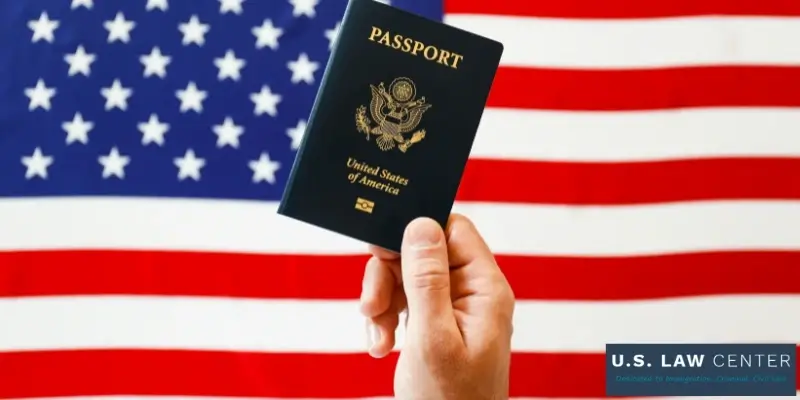If you currently have a green card, you may be wondering, “How much does it cost to become a U.S. citizen?’ Individuals who hold green cards in the U.S. can apply to become U.S. citizens after three to five years as legal permanent residents. Becoming a U.S. citizen through the naturalization process provides the qualified person with the same rights as natural-born citizens, including the right to vote, other basic civil rights, and protection from deportation.
Fees for U.S. Citizenship
In order to become a U.S. citizen, the naturalization process requires the following through the U.S. Citizenship and Immigration Services (USCIS):
- Filing the N-400 form, or the application for naturalization
- Attending an immigration interview
- Taking and passing the citizenship test
- Taking the naturalization oath of allegiance
The N-400 form costs $760 to file with paper forms and $710 to file online. Additionally, there is an $85 fee for biometrics, or fingerprinting. The naturalization process totals $710 to $760, although not every applicant is required to pay for and complete biometrics. There are also ways that fees can be reduced or waived. If you request a reduced fee or a fee waiver, you cannot file online.
Exceptions to Naturalization Fees
There are some individuals who do not have to apply for a waiver or reduction of fees. These are:
- Individuals 75 years or older. These applicants are not required to complete fingerprinting and therefore do not pay the biometrics fee.
- Members of the military. Applicants who are obtaining citizenship through their military services and through the Immigration and Nationality Act (INA) sections 328 or 329 are not required to pay any fees.
Application for Fee Waiver or Reduction
If you are unable to afford the fees for citizenship, you can request the fee to be reduced or waived.
To request a fee reduction, you must file Form I-942 with supporting documentation at the same time as your Form N-400. To qualify, your household income must fall between 150% and 200% of the federal poverty guidelines. If approved, the reduced fee for naturalization is $380. Note that reduced-fee applications must be submitted on paper, not online.
To request a fee waiver, you must file a Form I-912. To qualify for a waived fee, you must show the USCIS documentation and proof of financial need for the waiver. You can qualify for one of the following reasons:
- You, your spouse, or the head of the household receives a means-tested government benefit, such as food stamps, Supplemental Security Income (SSI), or Medicaid.
- Your household’s income is at or below 150% of the federal poverty guidelines, which is calculated based on the size of your household and the total income of the household.
- You are experiencing financial hardship, such as a sudden medical emergency or loss of employment.
If you are approved for the fee waiver, you do not have to pay the naturalization fees.
How to Pay Naturalization Fees
When you submit the Form N-400 through the USCIS’s online site, you can pay the fee through the same site.
If you are submitting a paper application, the fee must be sent in one of the following ways:
- Money order
- Personal or cashier’s check
- Credit card, using Form G-1450 to authorize the transaction
A check must be made payable to the U.S. Department of Homeland Security. These fees are non-refundable, regardless of the decision the agency makes on your application. An immigration lawyer can help ensure your payment and application are properly submitted.
Understanding the Process Timeline
Applying for U.S. citizenship typically takes five to eight months, though times vary by USCIS office. The process begins with the filing of Form N-400, which is followed by a biometrics appointment within a few months. Most applicants then attend their interview and civics test around four to seven months after filing.
If you are approved, you’ll attend the oath ceremony within weeks. Delays can occur due to incomplete application forms, missing documents, rescheduled appointments, or extended background checks. Working with an attorney, submitting complete applications, and attending all USCIS appointments on time can reduce delays.
Recent Law/Policy Changes
USCIS implemented a new fee schedule on April 1, 2024, which raised the naturalization filing fee to $710 for online applications and $760 for paper applications. Biometrics is now included in the filing cost. Reduced-fee applications must be filed on paper only. There is also a new civics test that becomes effective on October 20, 2025. This test replaces the 2008 Naturalization Civics Test, which had previously been implemented.
What Happens if My Application Is Denied?
If your citizenship application is denied, you may request a hearing with USCIS to appeal the denial of your application. While USCIS welcomed 818,500 new citizens in 2024, that figure also marked a 7% decline from the previous year, so denials can and do occur for a variety of reasons. Some applicants do not meet the residency requirements, while incomplete paperwork or failure to pass the civics test can also be issues.
Having legal representation during the appeal process can help you join the 47.8 million immigrants in the U.S. who account for 14.3% of the population. In California, immigration cases are handled at locations such as the USCIS Los Angeles Field Office, located at 300 N. Los Angeles Street, and the U.S. District Court, situated at 350 W. 1st Street.
How Long Do I Have to Be a Permanent Resident Before Applying?
Most applicants must hold a green card for five years before applying for U.S. citizenship. Spouses of U.S. citizens may apply after three years if they meet residency and marital requirements, while military members may qualify to apply sooner under special provisions.
During this time, applicants must maintain a continuous residence and physical presence in the U.S. Extended trips abroad, especially ones lasting over six months, can disrupt your eligibility and delay the application process.
Why You Should Hire an Immigration Lawyer
If you are eligible to apply for U.S. citizenship, your first priority should be to hire an immigration lawyer who has handled complex immigration cases. The nation’s immigration laws require applicants to follow strict procedures and steps.
Having an immigration attorney throughout the process can be crucial for securing citizenship status. An attorney can help you complete the application process, monitor your application status, and address problems as they arise.
FAQs
Is It Expensive to Become a U.S. Citizen?
As of April 2024, the naturalization fee is $710 if filed online or $760 if filed by paper. For some individuals, the biometrics service is not required. For individuals who are expecting a complex immigration process or who want to use all the resources they can to succeed, they can work with an immigration attorney. An attorney can protect an individual’s rights during the application and naturalization process. However, this does make the process of becoming a citizen more expensive.
How Long Does It Take to Become a Full U.S. Citizen?
The process of applying for citizenship, having it processed, and completing the naturalization steps and citizenship tests can take anywhere from eight months to two years. You can only apply for citizenship after a certain amount of time with a green card. For military members, this is one year; for those who married U.S. citizens, this is three years. Others must hold their green card for five years before they can apply for citizenship. Obtaining a green card is also a lengthy process.
How Long Do You Have to Stay in the U.S. to Get a Green Card?
A green card is a lawful permanent resident card that allows an individual to be a permanent resident of the U.S. to live and work. A green card may be employment-based, family-based, obtained through refugee status, or based on another eligible reason. For most green cards, there isn’t an amount of time you must live in the U.S. prior to obtaining a green card. However, once you have a green card, absences from the country longer than a year may rescind your permanent resident card.
Who Qualifies for a Citizenship Fee Waiver?
There is a fee waiver process for the fee required for a U.S. citizenship application. The fee waiver is submitted to the U.S. Citizenship and Immigration Services (USCIS) along with supporting documentation. This documentation shows that you are experiencing financial hardship and are unable to pay the necessary fee. This proof may show that you or your spouse receive government benefits, that your household income is at 150% of federal poverty guidelines or below, or there is another current financial hardship.
Contact U.S. Law Center for Your Immigration Case
At U.S. Law Center, we are familiar with the intricacies of immigration law in California. We can help you prepare and file for citizenship and can help determine your eligibility. If you are hoping to become a U.S. citizen in the future but must first apply for another residency status, we can talk you through your options. There are several paths to citizenship, and we can help determine which meets your needs and which you qualify for. If you are dealing with other immigration issues, including green card applications, residency status changes, or deportation proceedings, we can help. Contact U.S. Law Center for compassionate and experienced legal support.


